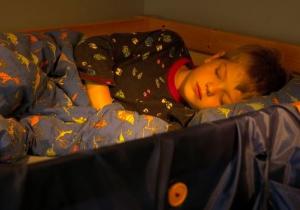Disturbed Sleep and Irregular Bedtimes Are Linked to Depression and Behavioral Problems in Children, Say Researchers

Research confirms that the warning label required by the FDA on antidepressants about the increased risk of suicidal thoughts and behavior for children and young adults is justified by scientific evidence.
Research suggests that dealing with children’s sleep problems can prevent depression and improve behavior in children.
Canadian researchers analyzed data on 1,689 children and 1,113 adolescents and concluded that disturbed sleep is associated with depression. The depression, in turn, was found to worsen the ongoing sleep problems in a cascading worsening of both.
However, their research also suggests that straightening out children’s sleep problems could prevent both the development of depression and worsening sleep problems.
“Our findings suggest that there might be a sensitive window between 5 and 12 years [of age] for sleep interventions to mitigate the emergence and/or growth of later depressive symptoms,” lead author Cecilia Marino, MD, PhD, of the Cundill Centre for Child and Youth Depression in Toronto, wrote in JAMA Network Open. [1]
Other research has also linked sleep and children’s behavior. British researchers found that 7-year-olds who did not have regular bedtimes had more behavioral difficulties, and their behavior got worse the longer they went without set bedtimes. When children changed from nonregular to regular bedtimes, their behavior improved significantly.
“What we’ve shown is that these effects build up incrementally over childhood, so that children who always had irregular bedtimes were worse off than those children who did have a regular bedtime,” lead author Professor Yvonne Kelly, PhD, of the Department of Epidemiology and Public Health at University College London, wrote in Pediatrics in 2013. “But our findings suggest the effects are reversible. For example, children who change from not having to having regular bedtimes show improvements in their behaviour.” [2]
“Having regular bedtimes during early childhood is an important influence on children’s behavior,” she concluded.
Dealing with children’s sleep is one natural, science-based approach to childhood depression and stands in stark contrast to administering powerful, mind-altering antidepressants. Currently, some 2.2 million American children under the age of 18 have been prescribed antidepressants, including 35,000 youngsters 0 to 5 years of age.
Many were prescribed antidepressants on the discredited theory of a chemical imbalance of the brain. Despite decades of massive brain research, a recent comprehensive review of the research has confirmed that there is no scientific proof that a low level of brain chemicals, such as serotonin, causes depression.
“The serotonin theory of depression has been one of the most influential and extensively researched biological theories of the origins of depression,” according to the study’s lead author Joanna Moncrieff, a psychiatrist and professor at University College London, writing in Molecular Psychiatry last month. “Our study shows that this view is not supported by scientific evidence. It also calls into question the basis for the use of antidepressants.” [3]
Antidepressants are especially risky for children. Since 2004, the FDA has required a black box label on antidepressants to warn of the increased risk of suicidal thoughts and behavior in children and teens after drug trials found that children taking the drugs doubled their risk of having suicidal thoughts or attempting suicide. The warning was expanded in 2007 to include young adults ages 18 through 24. The FDA website clearly lists “suicidal thinking” as one of the “serious risks” of antidepressants.
The validity of the black box warning was reconfirmed in a study led by Glen I. Spielmans, PhD, professor of psychology at Metropolitan State University in St. Paul, Minnesota, which analyzed data from antidepressant clinical trials. The researchers’ conclusion, published in Frontiers in Psychiatry in 2020: “Based on the sum of this evidence, regulatory warnings regarding antidepressant-linked suicidality are clearly warranted.” [4]
While it is not known how antidepressants work, it is known that the drugs disrupt the body’s normal biochemistry in ways that are not fully understood. A team of researchers led by Paul W. Andrews, PhD, an associate professor of evolutionary psychology at McMaster University, analyzed previous studies to determine the overall physical impact on the human body of antidepressants that target serotonin. Serotonin is a neurotransmitter that, in the course of the evolutionary adaptations of the human body, has come to regulate emotion, development, nerve cells, the clotting process, attention, electrolyte balance, and reproduction.
The researchers’ conclusion, published in 2012 in Frontiers in Psychology, was straightforward: “Our review supports the conclusion that antidepressants generally do more harm than good by disrupting a number of adaptive processes regulated by serotonin.” [5]
Psychiatrist Peter Breggin, M.D., describes antidepressants as neurotoxic because they harm and disrupt the functions of the brain, causing abnormal thinking and behaviors that include anxiety, irritability, hostility, aggressiveness, loss of judgment, impulsivity, and mania, which can lead to violence and suicide. [6]
The young are particularly vulnerable to these adverse effects, according to Breggin: “The harmful mental and behavioral effects of antidepressants are especially prevalent and severe in children and youth.”
The Citizens Commission on Human Rights (CCHR) continues to raise public awareness of the lack of scientific proof of the chemical imbalance theory and the known harms of antidepressants and other psychiatric drugs, so that consumers and their physicians can make fully informed decisions about starting and stopping the drugs. CCHR supports safe and science-based non-drug approaches to mental health.
CCHR recommends a complete physical examination with lab tests and nutritional and allergy screenings to identify any underlying physical causes of depression or other unwanted mental and emotional symptoms.
WARNING: Anyone wishing to discontinue or change the dose of an antidepressant or other behavioral drug is cautioned to do so only under the supervision of a physician because of potentially dangerous withdrawal symptoms.
CCHR was co-founded in 1969 by members of the Church of Scientology and the late psychiatrist and humanitarian Thomas Szasz, M.D., recognized by many academics as modern psychiatry’s most authoritative critic, to eradicate abuses and restore human rights and dignity to the field of mental health. CCHR has been instrumental in obtaining 228 laws against psychiatric abuses and violations of human rights worldwide.
The CCHR National Affairs Office in Washington, DC, has advocated for mental health rights and protections at the state and federal level. The CCHR traveling exhibit, which has toured 441 major cities worldwide and educated over 800,000 people on the history to the present day of abusive and racist psychiatric practices, has been displayed at the Congressional Black Caucus Foundation Annual Legislative Conference in Washington, DC, and at other locations.
[1] https://pubmed.ncbi.nlm.nih.gov/35994289/
[2] https://publications.aap.org/pediatrics/article-abstract/132/5/e1184/31637/Changes-in-Bedtime-Schedules-and-Behavioral?redirectedFrom=fulltext
[3] https://www.nature.com/articles/s41380-022-01661-0.pdf
[4] https://www.frontiersin.org/articles/10.3389/fpsyt.2020.00018/full
[5] https://pubmed.ncbi.nlm.nih.gov/22536191/
[6] https://breggin.com/antidepressant-drugs-resource-center
Anne Goedeke
Citizens Commission on Human Rights, National Affairs Office
+1 202-349-9267
email us here
Visit us on social media:
Facebook
Drugging Children – Did You Know?
Legal Disclaimer:
EIN Presswire provides this news content "as is" without warranty of any kind. We do not accept any responsibility or liability for the accuracy, content, images, videos, licenses, completeness, legality, or reliability of the information contained in this article. If you have any complaints or copyright issues related to this article, kindly contact the author above.



